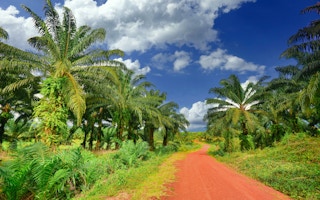To urge smallholder farmers to switch to sustainable forms of agriculture, we need local champions, said Olivier Tichit, director of sustainability at Musim Mas, one of the world’s largest integrated palm oil corporations.
He was speaking at the question-and-answer portion of a recent panel discussion titled Tackling Deforestation: Mobilising Multi-Commodities Landscape Collaboration, on which sustainability experts who worked on smallholders and landscapes initiatives spoke. The event, which was organised by Musim Mas in partnership with Eco-Business, was held at the Shangri-La, Kuala Lumpur, Malaysia, on 29 November 2022.
The other panellists were Stefano Savi, director at Global Platform for Sustainable Natural Rubber (GPSNR), Ristika Putri Istanti, deputy of programmes at Lingkar Temu Kabupaten Lestari (LTKL) and Martin Huxtable, global sustainable sourcing director at Unilever. The moderator was Jessica Cheam, founder and managing director of Eco-Business.
Tichit said local champions could play a key role in influencing fellow farmers to adopt sustainable farming practices such as crop diversification.
“If you’re a small farmer and you have limited amount of land, it can be quite scary to move to another [commodity]. Moving to agroforestry is scary for them as well,” said Tichit. “[We need to] find one farmer that will take that leap of faith.”
He added that the farmer has to have ample land and feel financially secure first in order to get started on planting other commodities.
Musim Mas draws from extensive experience engaging with smallholders in several provinces in Indonesia to improve their sustainability and livelihoods. It was awarded the Smallholder Impact Programme Award by the Roundtable on Sustainable Palm Oil (RSPO), the leading body for sustainable palm at the RSPO conference in November 2022.
So far, more than 40,000 independent smallholders have benefited Musim Mas’s programme in Indonesia. The programme provides them with the know-how to improve their production sustainably and improve their access to the supply chain.
The panellists agreed that poverty among smallholders is one of the main drivers of deforestration.
Savi said that “capacity building, working with smallholders, bridging this gap [in wealth] is the way we need to go to move forward.”
Capacity building refers to granting farmers access to agricultural knowledge and good practices to boost crop yield. This prevents small farmers from compensating for poor yields through deforestation to gain more land.
“They do [deforestation] because of hope, they want a better future. They do it to ensure that their families will be fed and their kids go to school,” said Tichit.
He said stakeholders can support local governments to provide better services and to encourage them to enforce laws to stop deforestation.
Another point of discussion was how premiums that customers pay for sustainably produced palm oil trickles down to the smallholder farmers.
Savi said that the issue was down to pricing. He said: “We need to price things better, and externalities need to be priced. When you’re going to have that, premiums are going to reach the farmers.”
Transparency and traceability
The panellists also discussed the relative merits of traceability and transparency in stopping deforestation.
In terms of traceability, The European Commission has proposed a regulation that requires the exact origins of commodities such as cocoa beans and palm oil to be traced to ensure that it did not come from deforested land. In practice, this means that every palm oil bunch must be traced throughout its supply chain all the way back to the specific plots of land it came from.
Tichit explained that both transparency and traceability answer the same question: “Do we have deforestation happening in our supply chain?” While traceability is concerned with the details, transparency is about companies practicing disclosure.
“I think transparency is a must. I think we can obtain transparency without having to go to traceability,” said Tichit. “Transparency will bring us closer to stopping deforestation. Traceability might be so much work that it distracts from stopping deforestation.”
Savi suggested that traceability be used to engage with farmers in order to promote better sustainability practices.
“We need to find ways to give value to investments to stimulate farmers to have the capability to keep forests standing,” he said. “This is done through engagement, and that’s where traceability can come in as an important tool.”






















